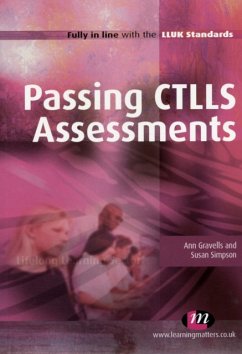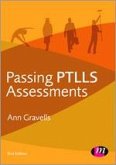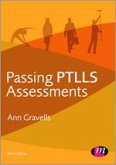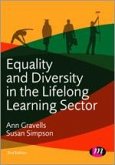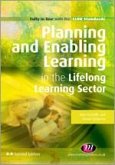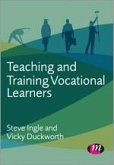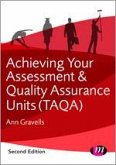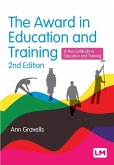- Broschiertes Buch
- Merkliste
- Auf die Merkliste
- Bewerten Bewerten
- Teilen
- Produkt teilen
- Produkterinnerung
- Produkterinnerung
A practical and accessible guide that helps students prepare for, understand and pass their CTLLS assessments.
Andere Kunden interessierten sich auch für
![Passing PTLLS Assessments Passing PTLLS Assessments]() Ann GravellsPassing PTLLS Assessments34,99 €
Ann GravellsPassing PTLLS Assessments34,99 €![Passing PTLLS Assessments Passing PTLLS Assessments]() Ann GravellsPassing PTLLS Assessments112,99 €
Ann GravellsPassing PTLLS Assessments112,99 €![Equality and Diversity in the Lifelong Learning Sector Equality and Diversity in the Lifelong Learning Sector]() Ann GravellsEquality and Diversity in the Lifelong Learning Sector40,99 €
Ann GravellsEquality and Diversity in the Lifelong Learning Sector40,99 €![Planning and Enabling Learning in the Lifelong Learning Sector Planning and Enabling Learning in the Lifelong Learning Sector]() Ann GravellsPlanning and Enabling Learning in the Lifelong Learning Sector45,99 €
Ann GravellsPlanning and Enabling Learning in the Lifelong Learning Sector45,99 €![Teaching and Training Vocational Learners Teaching and Training Vocational Learners]() Steve IngleTeaching and Training Vocational Learners41,99 €
Steve IngleTeaching and Training Vocational Learners41,99 €![Achieving Your Assessment and Quality Assurance Units (Taqa) Achieving Your Assessment and Quality Assurance Units (Taqa)]() Ann GravellsAchieving Your Assessment and Quality Assurance Units (Taqa)126,99 €
Ann GravellsAchieving Your Assessment and Quality Assurance Units (Taqa)126,99 €![The Award in Education and Training (Second Edition) The Award in Education and Training (Second Edition)]() Ann GravellsThe Award in Education and Training (Second Edition)86,99 €
Ann GravellsThe Award in Education and Training (Second Edition)86,99 €-
-
-
A practical and accessible guide that helps students prepare for, understand and pass their CTLLS assessments.
Produktdetails
- Produktdetails
- Further Education and Skills
- Verlag: SAGE Publications Ltd
- Seitenzahl: 160
- Erscheinungstermin: 24. März 2011
- Englisch
- Abmessung: 244mm x 170mm x 9mm
- Gewicht: 300g
- ISBN-13: 9780857253699
- ISBN-10: 0857253697
- Artikelnr.: 32313285
- Herstellerkennzeichnung
- Libri GmbH
- Europaallee 1
- 36244 Bad Hersfeld
- gpsr@libri.de
- Further Education and Skills
- Verlag: SAGE Publications Ltd
- Seitenzahl: 160
- Erscheinungstermin: 24. März 2011
- Englisch
- Abmessung: 244mm x 170mm x 9mm
- Gewicht: 300g
- ISBN-13: 9780857253699
- ISBN-10: 0857253697
- Artikelnr.: 32313285
- Herstellerkennzeichnung
- Libri GmbH
- Europaallee 1
- 36244 Bad Hersfeld
- gpsr@libri.de
Ann has been teaching, assessing and quality assuring in the FE and skills sector since 1983. Ann holds a Masters in Educational Management, a PGCE, a Degree in Education, and a Medal of Excellence for teaching. She is a Fellow of the Society for Education and Training, and holds QTLS status. Ann has been writing textbooks since 2006 which are mainly based on her own experiences as a teacher, and the subsequent education of trainee teachers. She aims to write in plain English to help anyone with their role. She creates resources for teachers and learners such as PowerPoints and handouts for the assessment, quality assurance, and teacher training qualifications which are available via her website. Ann has also worked for several awarding organisations producing qualification guidance, policies and procedures, training new staff, and carrying out the external quality assurance of teaching, assessment and quality assurance qualifications. Ann is the author of the following text books:· *The Award in Education and Training (2025) *Principles and Practices of Teaching and Training (2017) *Principles and Practices of Quality Assurance (2016) *Principles and Practices of Assessment (2015) *Achieving your Assessment and Quality Assurance Units (TAQA) (2014) *Passing Assessments for the Award in Education and Training (2013) *Preparing to Teach in the Lifelong Learning Sector (2012) *Passing PTLLS Assessments (2012) *What is Teaching in the Lifelong Learning Sector? (2012) *Delivering Employability Skills in the Lifelong Learning Sector (2010) *Delivering Adult Learning (2006) She is co-author of: *Achieving your Diploma in Education (FE & Skills) (2024) *The Best Vocational Trainer's Guide (2015) *The Certificate in Education and Training (2014) *Passing Assessments for the Certificate in Education and Training (2014) *Equality and Diversity in the Lifelong Learning Sector (2012) *Planning and Enabling Learning in the Lifelong Learning Sector (2010) *Passing CTLLS Assessments (2010) She has edited:· *50 Quality Improvement and Quality Assurance Approaches (2021) *50 Assessment Approaches (2020) *50 Teaching and Learning Approaches (2019) *Achieving QTLS Status (2018) *Study Skills for PTLLS (2012)
Introduction
The structure of the book and how to use it
Preparing for your assessments
Self
assessment activities and guidance for evidencing competence Planning and Enabling Learning Unit
Ways to negotiate appropriate individual goals with learners
How to plan for inclusive learning
How to use teaching and learning strategies and resources inclusively to meet curriculum requirements
How to use a range of communication skills and methods to communicate effectively
The minimum core in own practice
How reflection, evaluation and feedback can be used to develop own practice Principles and Practice of Assessment Unit
Key concepts and principles of assessment
Different types of assessment
The strengths and limitations of a range of assessment methods
The role of feedback and questioning in the assessment of learning
How to monitor, assess, record and report learner progress and achievement
How to evaluate the effectiveness of own practice The CTLLS qualification
PTLLS unit
CTLLS mandatory and optional units
Minimum Core
Teaching practice
Observed practice Appendices
Planning and enabling learning level 3
Criteria and self
audit
Planning and enabling learning level 4
Criteria and self
audit
Principles and practice of assessment level 3
Criteria and self
audit
Principles and practice of assessment level 4
Criteria and self
audit
Planning and enabling learning level 3
Examples of portfolio evidence
Planning and enabling learning level 4
Examples of portfolio evidence
Principles and practice of assessment level 3
Examples of portfolio evidence
Principles and practice of assessment level 4
Examples of portfolio evidence Index
The structure of the book and how to use it
Preparing for your assessments
Self
assessment activities and guidance for evidencing competence Planning and Enabling Learning Unit
Ways to negotiate appropriate individual goals with learners
How to plan for inclusive learning
How to use teaching and learning strategies and resources inclusively to meet curriculum requirements
How to use a range of communication skills and methods to communicate effectively
The minimum core in own practice
How reflection, evaluation and feedback can be used to develop own practice Principles and Practice of Assessment Unit
Key concepts and principles of assessment
Different types of assessment
The strengths and limitations of a range of assessment methods
The role of feedback and questioning in the assessment of learning
How to monitor, assess, record and report learner progress and achievement
How to evaluate the effectiveness of own practice The CTLLS qualification
PTLLS unit
CTLLS mandatory and optional units
Minimum Core
Teaching practice
Observed practice Appendices
Planning and enabling learning level 3
Criteria and self
audit
Planning and enabling learning level 4
Criteria and self
audit
Principles and practice of assessment level 3
Criteria and self
audit
Principles and practice of assessment level 4
Criteria and self
audit
Planning and enabling learning level 3
Examples of portfolio evidence
Planning and enabling learning level 4
Examples of portfolio evidence
Principles and practice of assessment level 3
Examples of portfolio evidence
Principles and practice of assessment level 4
Examples of portfolio evidence Index
Introduction
The structure of the book and how to use it
Preparing for your assessments
Self
assessment activities and guidance for evidencing competence Planning and Enabling Learning Unit
Ways to negotiate appropriate individual goals with learners
How to plan for inclusive learning
How to use teaching and learning strategies and resources inclusively to meet curriculum requirements
How to use a range of communication skills and methods to communicate effectively
The minimum core in own practice
How reflection, evaluation and feedback can be used to develop own practice Principles and Practice of Assessment Unit
Key concepts and principles of assessment
Different types of assessment
The strengths and limitations of a range of assessment methods
The role of feedback and questioning in the assessment of learning
How to monitor, assess, record and report learner progress and achievement
How to evaluate the effectiveness of own practice The CTLLS qualification
PTLLS unit
CTLLS mandatory and optional units
Minimum Core
Teaching practice
Observed practice Appendices
Planning and enabling learning level 3
Criteria and self
audit
Planning and enabling learning level 4
Criteria and self
audit
Principles and practice of assessment level 3
Criteria and self
audit
Principles and practice of assessment level 4
Criteria and self
audit
Planning and enabling learning level 3
Examples of portfolio evidence
Planning and enabling learning level 4
Examples of portfolio evidence
Principles and practice of assessment level 3
Examples of portfolio evidence
Principles and practice of assessment level 4
Examples of portfolio evidence Index
The structure of the book and how to use it
Preparing for your assessments
Self
assessment activities and guidance for evidencing competence Planning and Enabling Learning Unit
Ways to negotiate appropriate individual goals with learners
How to plan for inclusive learning
How to use teaching and learning strategies and resources inclusively to meet curriculum requirements
How to use a range of communication skills and methods to communicate effectively
The minimum core in own practice
How reflection, evaluation and feedback can be used to develop own practice Principles and Practice of Assessment Unit
Key concepts and principles of assessment
Different types of assessment
The strengths and limitations of a range of assessment methods
The role of feedback and questioning in the assessment of learning
How to monitor, assess, record and report learner progress and achievement
How to evaluate the effectiveness of own practice The CTLLS qualification
PTLLS unit
CTLLS mandatory and optional units
Minimum Core
Teaching practice
Observed practice Appendices
Planning and enabling learning level 3
Criteria and self
audit
Planning and enabling learning level 4
Criteria and self
audit
Principles and practice of assessment level 3
Criteria and self
audit
Principles and practice of assessment level 4
Criteria and self
audit
Planning and enabling learning level 3
Examples of portfolio evidence
Planning and enabling learning level 4
Examples of portfolio evidence
Principles and practice of assessment level 3
Examples of portfolio evidence
Principles and practice of assessment level 4
Examples of portfolio evidence Index

